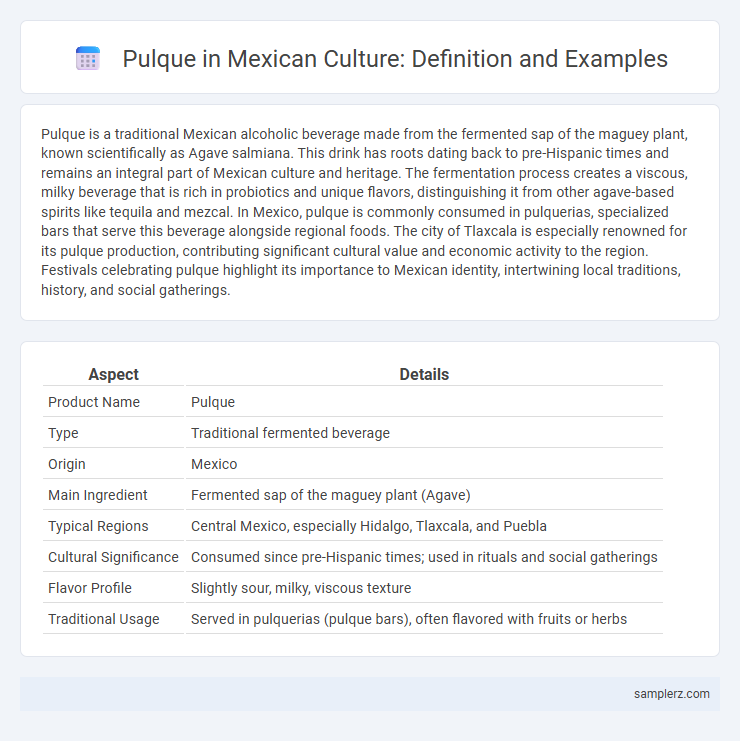Pulque is a traditional Mexican alcoholic beverage made from the fermented sap of the maguey plant, known scientifically as Agave salmiana. This drink has roots dating back to pre-Hispanic times and remains an integral part of Mexican culture and heritage. The fermentation process creates a viscous, milky beverage that is rich in probiotics and unique flavors, distinguishing it from other agave-based spirits like tequila and mezcal. In Mexico, pulque is commonly consumed in pulquerias, specialized bars that serve this beverage alongside regional foods. The city of Tlaxcala is especially renowned for its pulque production, contributing significant cultural value and economic activity to the region. Festivals celebrating pulque highlight its importance to Mexican identity, intertwining local traditions, history, and social gatherings.
Table of Comparison
| Aspect | Details |
|---|---|
| Product Name | Pulque |
| Type | Traditional fermented beverage |
| Origin | Mexico |
| Main Ingredient | Fermented sap of the maguey plant (Agave) |
| Typical Regions | Central Mexico, especially Hidalgo, Tlaxcala, and Puebla |
| Cultural Significance | Consumed since pre-Hispanic times; used in rituals and social gatherings |
| Flavor Profile | Slightly sour, milky, viscous texture |
| Traditional Usage | Served in pulquerias (pulque bars), often flavored with fruits or herbs |
Origins and Historical Significance of Pulque in Mexico
Pulque, a traditional Mexican alcoholic beverage made from the fermented sap of the maguey plant, has origins dating back to pre-Hispanic Mesoamerica, where it was considered sacred and consumed during religious ceremonies. Its historical significance is deeply tied to indigenous cultures, symbolizing fertility and divine blessing, while also serving as a social and ritualistic drink among the Aztecs and other native civilizations. The beverage's enduring cultural legacy continues to influence Mexican traditions and artisanal production practices today.
The Cultural Role of Pulque in Pre-Hispanic Societies
Pulque, a traditional fermented beverage made from the sap of the maguey plant, held significant cultural and religious importance in Pre-Hispanic Mexico, especially among the Aztecs. It was considered a sacred drink associated with various deities, rituals, and communal ceremonies, symbolizing fertility and divine nourishment. Pulque's role extended beyond consumption, serving as a medium for social cohesion and spiritual connection within indigenous communities.
Traditional Methods of Pulque Production
Pulque, a traditional Mexican alcoholic beverage made from fermented maguey sap, is produced using time-honored methods that date back to pre-Hispanic times. Indigenous producers carefully extract aguamiel from mature maguey plants, fermenting it naturally without added yeasts or chemicals, preserving the drink's authentic flavor and cultural significance. This artisanal process highlights the deep connection between Mexican heritage, indigenous knowledge, and sustainable agricultural practices.
Pulque in Mexican Rituals and Festivals
Pulque, a traditional Mexican fermented beverage made from the sap of the maguey plant, holds deep cultural significance in indigenous rituals and festivals across Mexico. It is often consumed during agricultural ceremonies and religious festivities to honor deities associated with fertility and the earth, particularly in regions like Tlaxcala and Hidalgo. The ritual use of pulque symbolizes communal unity and the preservation of ancestral traditions.
Pulque and Indigenous Identity
Pulque, a traditional alcoholic beverage made from the fermented sap of the agave plant, holds deep cultural significance among Indigenous communities in Mexico, particularly the Nahua and Otomi peoples. This ancient drink symbolizes Indigenous identity and heritage, often used in rituals and social ceremonies that reinforce communal bonds and ancestral knowledge. Preservation of pulque production supports both cultural sustainability and the revitalization of Indigenous agricultural practices in regions like Hidalgo and Tlaxcala.
Modern Revival: Pulque in Contemporary Mexican Culture
Pulque, a traditional Mexican alcoholic beverage made from fermented agave sap, has experienced a modern revival as younger generations embrace its cultural significance and artisanal production methods. In contemporary Mexican culture, pulque is celebrated in urban pulquerias and festivals, blending indigenous heritage with modern tastes and sustainability practices. This resurgence reflects a broader movement to preserve native traditions while fostering innovation within Mexico's dynamic food and drink landscape.
The Economics of Pulque: From Rural Farms to Urban Pulquerías
Pulque, a traditional Mexican alcoholic beverage made from fermented agave sap, plays a significant economic role in both rural agriculture and urban markets. Rural farmers cultivate agave plants, providing raw materials essential for pulque production, which supports local livelihoods and preserves indigenous farming practices. In urban centers, pulquerias serve as cultural hubs, promoting pulque consumption and fostering economic activity through tourism and local commerce.
Pulque in Mexican Art and Literature
Pulque, an ancient fermented agave beverage, holds a significant place in Mexican art and literature by symbolizing indigenous identity and cultural continuity. Artists such as Diego Rivera vividly depicted pulque in murals to celebrate its role in pre-Hispanic rituals and social gatherings. Literary works by writers like Juan Rulfo incorporate pulque to evoke rural Mexican life and traditional customs, emphasizing its cultural resonance.
Health Beliefs and Nutritional Aspects of Pulque
Pulque, a traditional Mexican fermented beverage made from the sap of the maguey plant, is deeply rooted in indigenous health beliefs that consider it a nutritious and restorative drink. Rich in probiotics, vitamins, and amino acids, pulque supports digestive health and boosts the immune system. Its low alcohol content and natural fermentation process contribute to its reputation as a functional food with both cultural and nutritional significance in Mexico.
Pulque Tourism: Experiencing Pulque in Mexico Today
Pulque, a traditional Mexican alcoholic beverage made from fermented agave sap, plays a significant role in the cultural heritage of Mexico, particularly in regions like Hidalgo and Tlaxcala where pulque tourism thrives. Visitors can experience pulque in its authentic form at pulquerias, historic pulque bars offering various flavors and workshops on its artisanal production. This growing interest in pulque tourism highlights the beverage's importance in Mexico's indigenous traditions and supports the preservation of centuries-old fermentation techniques.

example of "pulque" in "Mexico Infographic
 samplerz.com
samplerz.com